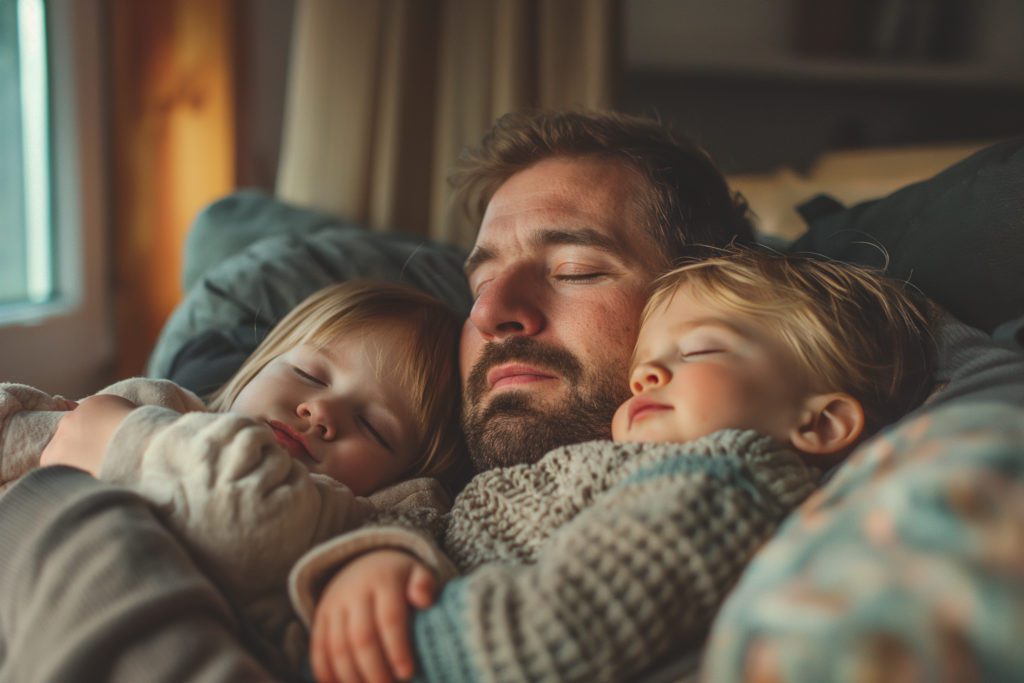
Teenagers and Caffeine: Understanding the Effects on Sleep Quality
Did you know that caffeine negatively impacts teen sleep? Explore how caffeine intake limits teen sleep quality and how to reverse these challenges.

Many of us are well aware of the power of caffeine and what it does to our sleep quality. If we drink caffeine too late in the day, some might have trouble falling asleep, or worse, we might struggle to get enough quality sleep. But what does it do to teens? Is there a similar effect, or is it different from what studies on adults have presented? That’s precisely what we’ll look into today in this article.
We’re going to explore how caffeine disrupts teen sleep, including issues such as the maintenance of the circadian rhythm, slow wave sleep duration, and more. We’ll also look at how to manage caffeine intake amongst teens to benefit from its powerful boost of energy without hurting our ability to rest. By the end of this article, you’ll have a greater idea of what caffeine does to teens and how you—or your teen—can protect their rest.
What is the Impact of Caffeine on Teen Sleep
Much of the research on caffeine and teen sleep is precisely what you might think: there is a connection between caffeine intake and teen sleep. People have discovered that caffeine intake is impacted by one’s quality of rest, but one’s duration of sleep is directly affected by one’s caffeine intake. In other words, if you have too much caffeine one day, you’ll sleep poorly and then continue the same pattern the next day (Source: MDPI).
Many people have attributed this to a unique bidirectional relationship between teen sleep and caffeine, suggesting an intricate relationship that we must navigate. It’s true—and it is an insight that helps us a great deal as we seek to understand how caffeine affects sleep quality and duration. However, caffeine impacts so much more than just duration; it also affects the type of sleep that we get, precisely what stage of sleep our brains are able to engage in overnight.
Specifically, many studies have shown that caffeine actually limits adolescent sleep duration. Some teens actually experience a later bedtime and a later waketime, sometimes one that is not at all congruent to their schedule as high school students. Others have been proven to experience a reduction of their must-needed slow-wave sleep, a stage of rest that is important for their overall health and longevity. As you can see, caffeine wreaks havoc on teens and their sleep, but how does it affect sleep quality?
How Caffeine Intake Affects Sleep Quality
We have touched upon this briefly, but based on the research available from the field, there is reason to believe that caffeine intake leads to nothing but poor sleep quality. That’s because one study discussed how caffeine intake was associated with sleep onset disturbances and decreased sleep quality, making it clear that caffeine hurt rather than helped teens sleep (Source: Journal of Pediatric Psychology).
However, caffeine also leads to more teens waking up in the middle of the night, a clear sign of poor sleep quality. Higher caffeine intake is linked to teens being more likely to wake up during sleep, less slow-wave activity, as discussed before, and even lowered self-reported quality of rest. All of this indicates that caffeine impacts sleep quality negatively, making it even harder for teens to find ways to support their health.
While these conclusions are confirmed by multiple researchers, they are an unfortunate sign of the need for better management of caffeine consumption. In today’s fast-paced world, it can feel nearly impossible to get through the day without caffeine. But we must find ways to prioritize our sleep quality and energy levels. Fortunately, there are some proven ways that can help you get better rest and also enjoy caffeine from time to time.
Managing Caffeine Intake to Improve Teen Sleep
In a perfect world, limiting one’s caffeine intake to none at all would be the best-case scenario. With teenage sleep already disturbed biologically due to adolescent development and shifting circadian rhythms, avoiding caffeine, like energy drinks, would be best.
After all, caffeine negatively impacts sleep, whereas other foods, like vegetables, fruits, and milk, can support better rest. However, if you must intake caffeine as a teen or know a teen who needs it for energy support, here are some tips to help improve your sleep:
- Follow Guidelines for Recommended Consumption: Many make the big mistake of not following guidelines for proper caffeine consumption. For example, if the drink’s label states that people should not drink more than one cup per day in the morning, follow their recommendations for best results.
- Avoid Energy Drinks: Today’s energy drinks are so much more than just a standard shot of espresso! Scientists have shown that some energy drinks can actually block adenosine, which is required for adequate sleep, and prevent normal sleeping patterns from occurring (Source: PubMed).
- Do Not Drink Caffeine After Noon: Depending on when your teen or you go to bed, avoiding caffeine up to six hours or more before bed will allow you to get better rest. One study showed that drinking caffeine within six hours of bed led to disruptive sleep patterns (Source: Journal of Clinical Sleep Medicine).
If you follow these tips or encourage your teen to do so, you’ll see a difference in their health and their overall sleep quality. Since caffeine has such an impact on teen sleep health—even as little as 10 milligrams—it is vital to take steps to prioritize your overall well-being.
What Steps Will You Take to Prioritize Your Sleep?
By understanding how caffeine affects teen sleep, you can take steps to protect your health or your teen’s rest. Because teens struggle with disrupted sleep, less slow-wave sleep, and even later wake and bedtimes, it is clear that widespread caffeine consumption can be a real hindrance to teen health. If you follow the tips we have provided, you can promote your health and well-being, as well as your sleep health. For more tips and guides on how to encourage better rest and recovery, visit our website today to learn more!
FAQ
What are the recommended caffeine limits for teenagers?
Health experts recommend teenagers limit caffeine intake to no more than 100 mg per day—about one cup of coffee. Excess consumption can negatively affect sleep and mood. Since teens are more sensitive to caffeine's effects, exceeding this limit may lead to dependency and long-term health risks.
How does caffeine affect teenagers' mental health?
Caffeine can increase anxiety, nervousness, and restlessness in teenagers by stimulating the central nervous system. Overuse may lead to mood swings, difficulty managing stress, and even exacerbate symptoms of depression. Teens with pre-existing mental health conditions may experience worsened symptoms with regular caffeine consumption.
Can caffeine consumption lead to dependence in teenagers?
Yes, regular caffeine consumption can lead to dependence. Teens may develop tolerance over time, requiring higher amounts to feel the same energy boost. When caffeine intake is reduced, withdrawal symptoms like headaches, fatigue, irritability, and difficulty concentrating can occur, making it difficult to cut back.
How does caffeine impact teenagers' academic performance?
While caffeine can temporarily enhance alertness and focus, excessive intake disrupts sleep patterns, leading to fatigue and reduced concentration during the day. Poor sleep can impair memory, problem-solving skills, and academic performance. Relying on caffeine instead of healthy sleep habits can worsen productivity.
Is it safe for teenagers to consume caffeine before physical activities?
Some teens use caffeine before sports to boost energy and endurance, but it can also cause dehydration, increased heart rate, and jitteriness. Overconsumption may lead to dizziness or nausea during physical exertion. Staying hydrated with water and maintaining balanced nutrition is a better alternative.
How can parents help manage their teenagers' caffeine consumption?
Parents can monitor their teen's caffeine intake by encouraging open discussions about its effects and promoting healthier a balanced intake. Setting limits on coffee and energy drink consumption at home, educating teens on reading labels, and leading by example with balanced habits can help prevent overuse.

Written by
Marie Soukup
Marie Soukup is a seasoned copywriter, editor, and Integrative Nutrition Health Coach with a certificate from the Institute of Integrative Nutrition (IIN). With years of experience working with brands across diverse industries, Marie is passionate about holistic health and crafting compelling content.
Download Pillow
Get help
Press & News
Legal
Connect
X (Twitter)
Company
Copyright © Neybox Digital Ltd.



